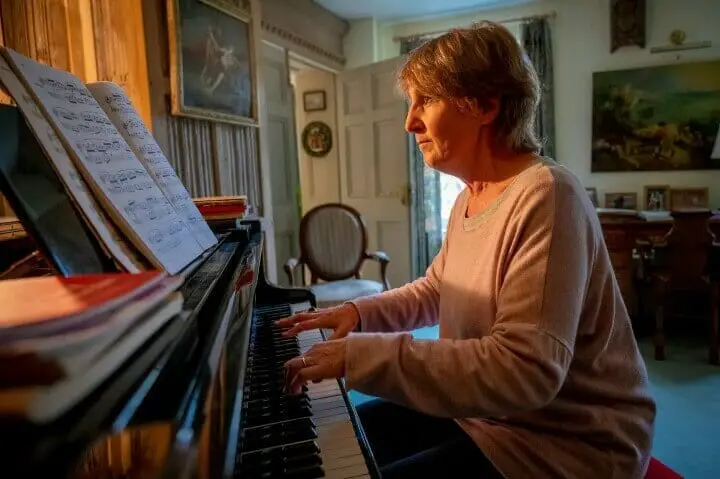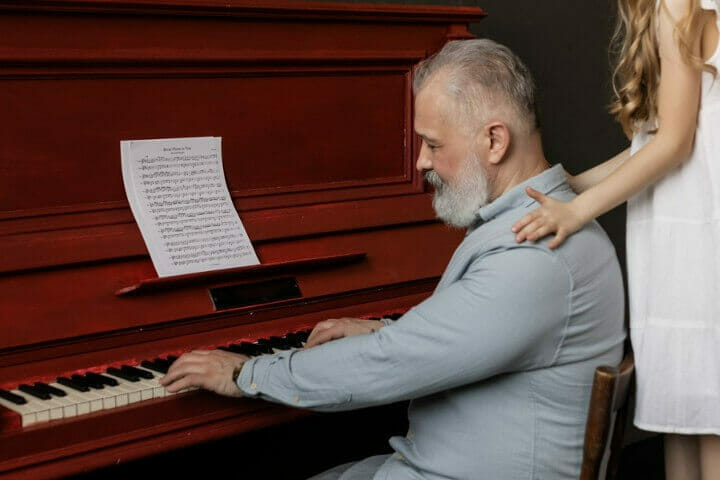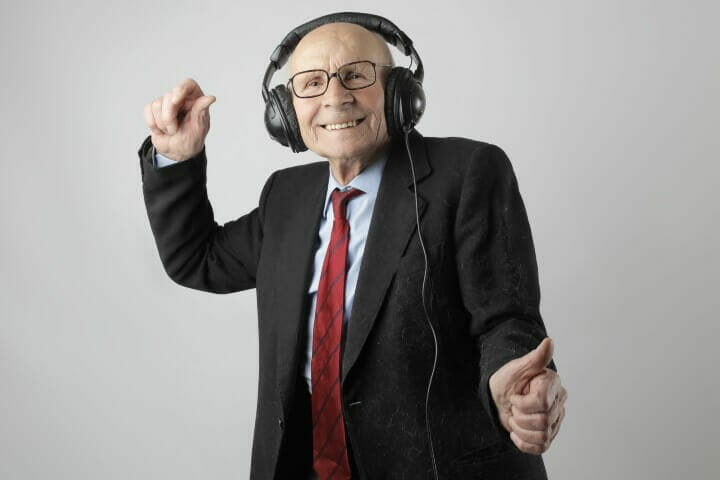Music therapy has been shown to be beneficial for people of all ages who are recovering from traumas or living with chronic illnesses, and seniors are no different. Music therapy can offer many physical and mental health benefits, and it is becoming much more common as an alternative or complementary treatment for people living with various conditions.
If you’re wondering exactly how music therapy can help your senior loved one, here is a little more information on what you can expect and how it’s beneficial.
Contents
Promotes Cognitive Function and Mental Health
If your loved one is living with Alzheimer’s or dementia, music therapy can really make a big difference in their live.
Research has shown that activities like listening to music, learning to play an instrument, singing or even just practicing an instrument they already knew how to play will increase the blood flow to certain areas of the brain – areas that are affected by Alzheimer’s and dementia.
Activities that are rich in music can help keep the brain young, active and sharp. It can also really help to slow the cognitive decline in senior adults, even if they have not been diagnosed with an illness like Alzheimer’s or dementia.
You may notice the changes when you come to visit your loved one in that they are more alert and aware of your presence, they may even have more lucid days where they know who you are and can really enjoy your time together.
This is not to say it will guarantee more lucid days and better cognitive abilities, but a lot of research has been done and this result has happened in many cases of patients living with illnesses that affect mental health and cognitive function.
Improve memory and concentration
Activities where participants have to focus and remember things – like learning to sing or play a new song – will translate into better memory in other aspects of their lives.
Additionally, learning to play a new instrument they have never touched before can also have this same effect on their lives. These kind of exercises and activities involve a great deal of repetition, which is actually the function that helps improve the memory and concentration part of our brains.
As an added bonus, these activities not only help improve brain memory but muscle memory too. So it can benefit your physical well being and not just your mental health function.
Better communication skills
Part of dementia, most families will notice, is that it can drastically impact your loved ones speech and communication abilities. Music therapy has been shown to help slow down that decline so your loved ones can maintain their ability to communicate for as long as possible.
If your loved one is already nonverbal (either as a result of Alzheimer’s or dementia, or they have been nonverbal for a portion of their life), they may still be able to enjoy the benefits of music therapy by humming along to the song or moving their hands.
Another bonus is that music, in general, can help us communicate our wants and needs that we may have a hard time speaking about. When participating in music therapy, people are encouraged to put what it is they want to say into a song and it can help them communicate to others how they are feeling.
Singing or playing a song can help them feel as though they are expressing themselves in a way they were never able to before so it may also help them feel a little more relaxed or calm.
Help reduce depression
No matter what kind of music your loved one likes to listen to, music has this way of making almost anyone feel better because it conveys emotions and feelings we can all relate to.
Research has shown that when music therapy is combined with the appropriate standard drug treatment (as prescribed by a medical doctor), there was a notable positive difference in the symptoms of older adults living with depression.
Learning a new instrument – like the piano – or learning a new song can definitely enhance your loved one’s mood and even boost their self-esteem. It’s a fun way to spend time, especially for those who just love music, and it gives them something to be proud of for accomplishing.
There is this sense of achievement that comes when anyone learns something new, and that feeling can lead to a decline in the symptoms of depression your loved one is experiencing.
Decreased stress and anxiety
Has your loved one recently moved into a retirement home or nursing home, and they’re nervous or stressed about their surroundings because it’s not quite home yet?
Music therapists can design programs using instrument, themes, lyrics or rhythms to help those who are participating relax and feel calmer in their environment.
This kind of relaxing environment can help to slow down their heart rate, which then in turn lowers the levels of cortisol (or the stress hormone) in their body.
When cortisol levels are lowered seniors will feel calmer and more relaxed in their environment, and it will help them deal with stress much better.
For those people who are living with Alzheimer’s or dementia, new environments can be especially difficult because they feel alone and aren’t sure what is going on or why they don’t recognize anyone there. Music therapy can help them relax in their new environment and feel much more comfortable in their surroundings.
Improve physical movement
Staying active is an important component of staying healthy – at any age. Music therapy does also involve physical movements too – it’s not just about singing.
Making music together and getting up and singing does have a physical part to it, so music therapy can definitely have a positive effect on your physical abilities while improving your mental and emotional health, too.
Whether it’s tapping their toes, clapping their hands or swaying to the music – maybe even completely getting up and dancing – music therapy will definitely help seniors work on their physical mobility during the sessions.
There are some musical activities where participants are making music together by each person playing a handheld instrument with other people. While participants may have never played an instrument before, they will be able to join right in with others during the music therapy session and help make some music.
Help encourage socialization and making friends
Often times, music therapy is not a one-on-one activity and there will be a group of people who are participating in it at a time.
Since your loved one will participating in a group music therapy session, it will promote socialization and the formation of friendships. Seniors who are participating in these programs will be encouraged to engage and communicate with each other.
Through these activities, your loved one will be able to make new friends and perhaps get to know their new environment a little better. They might also feel like they are more part of a community when there is a mutual enjoyment for them.
This socialization can help to alleviate the feelings of isolation and loneliness that seniors so often feel, especially when they are living away from their family or friends.
Whether your loved one lives in a retirement or nursing home, or is still in the home they’ve known for years, music therapy can be beneficial for a variety of reasons.
Music is something universal, and it brings people together – even if they don’t like the same types of music. If your loved one is living with an illness that affects their mental health – like Alzheimer’s or dementia – music can improve their cognitive abilities and memory function and will help slow down the development of their symptoms.
Music therapy is becoming much more common as a treatment to help people living with mental and memory-based illnesses. While music therapy is not meant to completely replace any medication or drug therapies, and you should always take the advice of your medical team in regard to that, but it can definitely benefit your loved one when it’s combined with the other medical treatments they are receiving.
If your loved one has just moved into a long-term care facility, they may feel a little out of place and aren’t sure what’s going on since they don’t recognize anyone there or their surroundings.
Participating in music therapy can help your senior loved one relax and feel more comfortable in their new home. Additionally, it can help them meet new people and make friends when they were previously feeling very isolated or alone.
If you are trying to find music therapy options for your senior loved one, you can search for local options online or even talk to their doctors to see if they have any recommendations.
Enrolling your loved one in music therapy even once a week will be incredibly beneficial to them and you will see the change in them for sure. From improved memory and cognitive abilities – like more lucid days with Alzheimer’s or dementia – to them making new friends and connections, they will definitely benefit from this kind of therapy.





